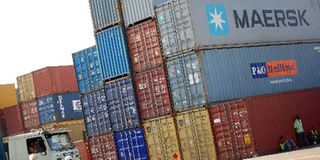Tanzania, Burundi hold back single customs zone bid

A container freight station at the port of Mombasa. Less than two months to a self-imposed deadline for full implementation of the Single Customs Territory, only three out of the five East African Community countries have embraced the system. FILE PHOTO
What you need to know:
- KRA estimates that the time taken to transport goods from the port of Mombasa to Uganda has been cut from 18 days to four days partly due to implementation of the Single Customs Territory (SCT).
- Under the SCT, tax authorities from the five partner states are expected to carry joint collection of revenues at ports of entry into the region
Less than two months to a self-imposed deadline for full implementation of the Single Customs Territory, only three out of the five East African Community countries have embraced the system.
The presidents of member states in November last year agreed on a July 1, 2014, date but only Kenya, Uganda and Rwanda have begun the implementation process. Burundi and Tanzania are yet to come on board.
Under the territory, tax authorities from the five partner states are expected to carry joint collection of revenues at ports of entry into the region drastically reducing the time taken to transport cargo across borders.
OPERATIONAL COSTS
This would cut operational costs and significantly improve the regional business climate.
Kenya Revenue Authority (KRA) officials said Monday they expected Tanzania and Burundi to begin implementing the decision soon.
Although a protocol making provisions for the SCT was adopted by the community in 2005, the full implementation of the system has been consistently delayed during the ensuing years.
“However, since the customs union came into force and subsequent conclusion of the EAC Common Market Protocol, and the monetary union, the objectives of the customs union protocol have not been realised fully,” said KRA deputy commissioner of customs Nicholas Kinoti.
The official, who was speaking in Nairobi on Monday during an awareness forum, said some of the broad objectives of the customs union are to promote intra-regional trade by supporting industrial growth, attracting investment and eliminating non-tariff barriers to promote circulation of goods.
SEVERAL BENEFITS
He said several benefits have been reported from the roll-out of the pilot stage, ranging from increased revenue, higher cargo-clearance volumes and less goods-clearance time.
KRA estimates that the time taken to transport goods from the port of Mombasa to Uganda has been cut from 18 days to four days partly due to implementation of the SCT.
In the initial stages, the plan began with clearance of oil and is currently being structured to include cement, edible oils, milk and milk products as well as confectioneries.
The system has been in use in Kenya, Rwanda and Uganda on a pilot basis since January 1.





